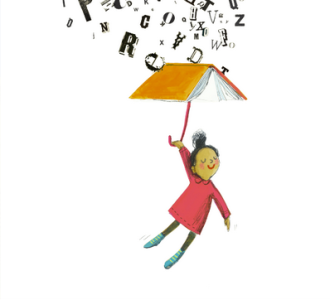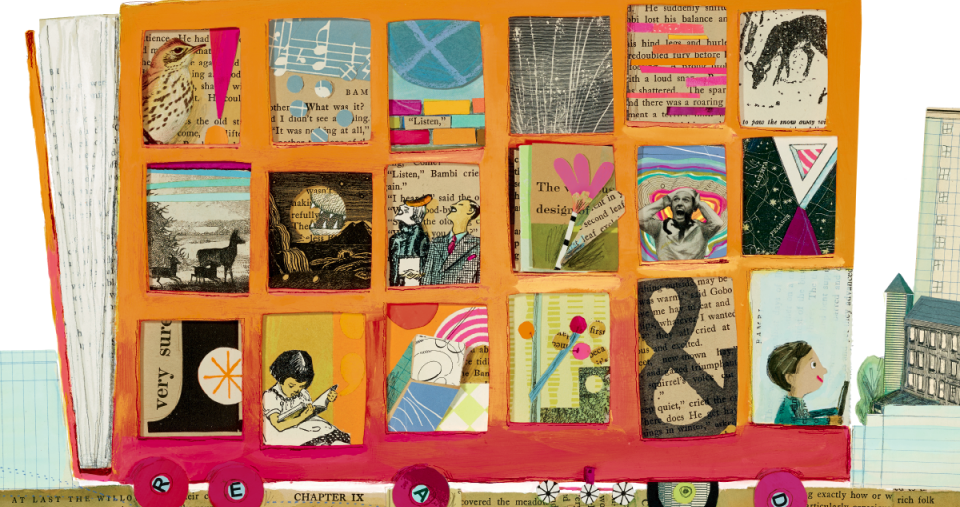Mary Nagel Sweetser Lecture
Christopher Myers will deliver the 2025 Mary Nagel Sweetser Lecture for Are We There Yet? Myers debuted with illustrations for The Shadow of the Red Moon (Walter Dean Myers, 1995) and has been pushing boundaries ever since. He earned a Caldecott Honor for Harlem (Walter Dean Myers, 1997) and the Coretta Scott King Award for Firebird (Misty Copeland, 2014).
His tapestries, stained glass paintings, and sculptures share visions of migration, globalization, and colonization. His work has been exhibited in the MoMa PS1, the Studio Museum in Harlem, and the Goethe Institute in Ghana. Regardless of medium, format, or audience, Myers invites viewers to pause to confront difficult truths and revel in joyful moments.
In two pivotal essays, “Young Dreamers” (The Horn Book, 2013) and “The Apartheid of Children’s Literature” (The New York Times, 2014), he asserts that we are not nearly there yet. As Creative Director for the Make Me a World imprint, he insists that “no young person is invisible, no kid’s story is erased, and no glass ceiling presses down on the dreams of a child.”
Institute Speakers
Traci Chee’s metafictive The Reader Trilogy transports young adult audiences to an illiterate society with a mysterious book at its center. We Are Not Free (2020) recounts the tragic past of Japanese Americans imprisoned in concentration camps during WWII and was a National Book Award Finalist, a Printz Award Honor, and an Asian/Pacific American Youth Literature Honor title.
In the Ezra Jack Keats Honor book Benito Juárez Fights for Justice (2023) and Desert Song (Laekan Zea Kemp, 2024), Beatriz Gutiérrez Hernández immerses readers in detail-rich settings that depict the interconnectedness of characters—human and animal, living and ancestral—and their natural and built environments.
Vashti Harrison, author and illustrator of the Little Leaders and Little Dreamers series, heralds famous and lesser-known women who shaped Black history. The first Black woman to win the Caldecott Medal, Harrison claims her own place in history with Big (2023) whose varied, calibrated book design, sharp use of font as a picture element, and commanding gatefold affirms the beauty and selfhood of a young, big Black girl.
In Adib Khorram’s debut novel Darius the Great is Not Okay (2018), Iranian, white, queer depressed Darius embarks on his first trip to Iran, a journey of familial and self-discovery. The novel won the William C. Morris YA Debut Award, the Asian/Pacific American Young Adult Literature Award, and Boston Globe-Horn Book recognition. Khorram writes across age groups and formats and recently published his first novel for adults, I’ll Have What He’s Having (2024).
Long before he arrived with the smash novel Wicked (1995), Gregory Maguire participated in one of the Center’s first summer institutes, was the first graduate of the Simmons MA in Children’s Literature, and served as a faculty member and Associate Director of the program. A consummate revisionist and storyteller, he reinvigorates the genre of the animal fantasy in Cress Watercress (2022).
For almost a decade, Ellen Keiter served as the Chief Curator at the Eric Carle Museum of Picture Book Art. Ellen’s exhibitions forged meaningful connections between visitors of all ages and original picturebook art.
Breanna J. McDaniel’s picturebooks honor quotidian and exceptional Black lives. Hands Up! (Shane Evans, 2019) reclaims the everyday act of raising one’s hands. Ezra Jack Keats Award book Go Forth and Tell celebrates The Life of Augusta Baker, Librarian and Master Storyteller (April Harrison, 2024). McDaniel is a co-founder of Researchers Exploring Inclusive Youth Literature (REIYL).
Rotem Moscovich, Editorial Director of Picturebooks at Alfred A. Knopf Books for Young Readers, champions notable picturebook creators. She guided books by Are We There Yet? speakers including Hot Dog (2023) by Doug Salati and My Pen (2015) by Christopher Myers.
Lauren Rizzuto returns to Simmons as the 2025 Carol S. Kline Visiting Instructor to teach the graduate course that culminates in this year’s Institute. She has taught graduate and undergraduate courses in Children’s Literature and currently serves as the Department Chair of English at the Willow School in New Orleans. Her scholarship and teaching interrogate representations of climate change and environmental justice in literature for young people.
In a quintessential, Are We There Yet? moment, Doug Salati’s Caldecott-winning Hot Dog (2023) stretches out the journey for a dachshund and their human as they escape from a claustrophobic city to their breezy, beach retreat. Salati’s spare, lyrical text emphasizes the emotional connection between the canine-human duo and reminds readers that who you get “there” with matters.
Cynthia Leitich Smith (Muscogee Nation) earned a law degree on her path to becoming an award-winning author of books for young people that center Indigenous lives. Smith publishes the digital newsletter Cynsations, curates the Heartdrum imprint, and is the 2025 ALSC Children’s Literature Lecturer Award Winner. Recent publications include On a Wing and a Tear (2024) and the Blue Stars graphic novel series (with Kekkla Magoon, illustrated by Molly Murakami).
Lisa Yee began 2025 crisscrossing the country talking with children about the second book in The Misfits series, A Copycat Conundrum (illustrated by Dan Santat, 2025). A versatile author, Yee’s sense of humor shines through in stories about quirky, complicated characters. Recognized as a National Book Award Finalist, Maizy Chen’s Last Chance (2023) received a Newbery Honor and the Asian/Pacific American Children’s Literature Award.
Paul O. Zelinsky defies a single approach as he moves from the stylized work of The Maid and the Mouse and the Odd Shaped House (1981), to the Italian Renaissance elegance of the Caldecott-winning Rapunzel (1977), to the zany watercolor and inkjet art for Z is for Moose (Kelly Bingham, 2013). In Still Life (Alex London, 2024), Zelinsky blends digital and traditional techniques to grant agency, humor, and motion to a still life painting with an existential crisis.


